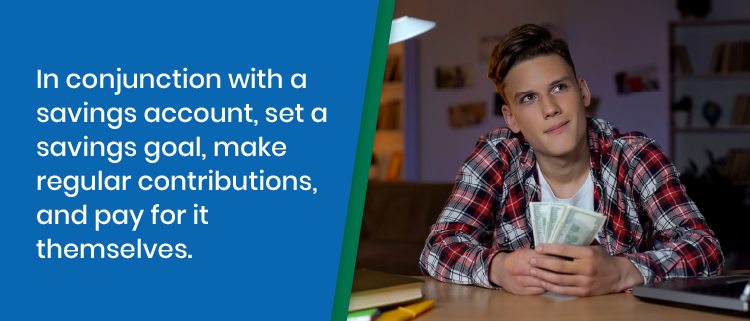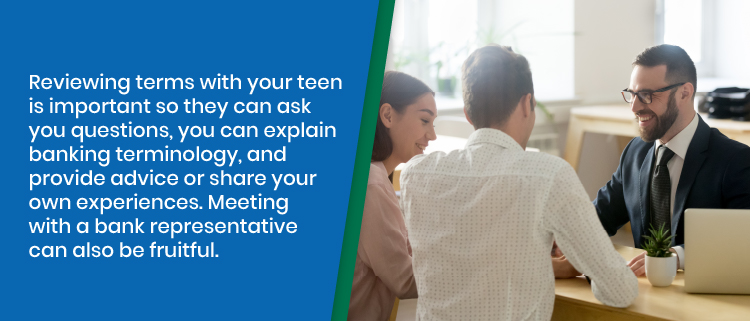
As Get Schooled explains in their article Why Teens Should Open a Bank Account, “Opening a bank account is a key step toward financial independence and security.” Checking accounts are an essential financial management tool, facilitating you in paying for purchases, receiving paychecks, building savings, and even applying for credit. Getting started with a checking account for your teen early can help prepare your teen for financial stability and success.
But it can also be an intimidating process. From exploring options, choosing features, and effectively managing the account once it’s opened, you may be wondering if your teen (or you!) are ready for the undertaking. In this post we’ll provide a brief overview of teen banking benefits, how to compare accounts (and financial institutions!), and how to apply once you’ve chosen the right account. Keep reading to learn everything you need to know about checking accounts for teens!

When should I set up a checking account for my teen?
The simple answer is, the earlier the better. In today’s cashless age, it’s harder and harder for individuals to make routine transactions, from purchasing clothing to buying a meal at a food truck, with cash alone. But debit cards (and Venmo-linking!) aren’t the only benefit of having a checking account. When you are teaching your teen how to manage their expenses, having a written record (accessible any time on their phone!) of every purchase they make can help them better understand their cash flow, and how quickly spending can add up. Lastly, it’s important for your teen to have a bank account before their first job. Many employers prefer or even require a bank account for automatic paycheck deposits. And even if paper checks are an option, automatic deposit ensures your teen never loses a paycheck.
At Palisades, Youth Checking Accounts can be opened as early as age 13 and kept until age 22, when they are automatically converted to basic checking accounts. Until your teen turns 18, you will be a joint owner on the account, which can help you keep an eye on their spending and teach financial responsibility.
Before age 13, kids can have their own Youth Savings Accounts. With 1.5% APY, our accounts are a great place to start, and can later be linked to Youth Checking Accounts for a seamless transition. Starting savings habits early can help children early develop strong lifelong financial skills.

Why does my teen need a checking account?
We’ve touched on the basic reasons why checking accounts are useful—but it all comes down to providing the right tools to help your teen establish their financial independence.
As your child gets closer to adulthood, it becomes more and more important to teach them financial responsibility. A checking account can help your teen achieve these important milestones and life skills:
- Learn how to balance income and spending.
- In conjunction with a savings account, set a savings goal (like a vehicle or laptop for school), make regular contributions, and pay for it themselves.
- Understand the value of a dollar and feel the pride of working for something and paying for it oneself.
- Learn best practices for managing money and keeping it safe, using an FDIC-insured account.
Beyond the practical applications of checking accounts, from providing widely-used payment methods to a convenient way to receive paychecks, checking accounts can become a cornerstone of learning the basics of sound financial management.
What benefits are included in Teen Checking Accounts?
Like other basic checking accounts, teen accounts come with a variety of perks to help your teen better manage their money. These include:
- A personal debit card with secure chip technology.
- Online banking and mobile app to access account information and transaction records, make transfers, and view statements from your teen’s computer or mobile device.
- Automatic transfers to savings account. Your teen can reach their savings goals even faster when they automatically transfer money from the checking to their Palisades Youth Savings Account, where they can earn 1.5% interest!
- Specialized financial advice and resources from our credit union. Your teen can easily request an appointment to address questions or create a savings plan. And anytime your teen needs help, we’re just a phone call away.
- Their account grows with them—easy conversion to an adult checking account. Once your kid turns 22, their account will automatically convert to a basic checking account—no action required!

Where do we start?
First, determine what kind of account is right for your child. If they already have a youth savings account and are 13 or over, they may be ready to open their first checking account. If not, it might be a good idea to start with a savings account to develop those preliminary banking skills.
Starting with a savings account, especially if your child or teen has no immediate need for a checking account, can be an effective stepping stone. If your child is simply looking for a safe place to store their nestegg and deposit birthday money, there’s nothing wrong with keeping it simple at first, and moving onto a checking account once they’ve mastered savings.
However, if your child is over 13, they want to have the financial freedom to make their own purchases, or are looking to get a job soon, it's probably time to open a checking account. Managing a checking account is certainly an upgrade in responsibility, but keep in mind that under the age of 18, a parent or guardian will also be on the account, and you can assist them in day-to-day management as needed, until they are ready for greater independence.
Choosing a Financial Institution
While it might seem like an obvious choice to choose the bank that you currently use, not all banks cater to young customers in the same way. Large, national banks may offer fewer services, their customer service may be less accessible, and they may be less flexible in working with a young banking customer. Explore options at multiple local banks, visiting a branch and speaking to a representative before making a final decision.
Often, a smaller community bank or credit union who will work one on one with you and your teen as they learn the basics of banking proves to be a better fit. Additionally, credit unions especially may offer better interest rates on savings accounts—an added benefit for new savers! To learn more about the benefits of joining a credit union, check out our recent post.
Working with Your Teen to Understand the Fine Print
As you narrow down your account options, be sure to work with your teen to analyze the small print. Is there a minimum balance? Are there monthly fees? Is the account overdraft protected? What happens if you withdraw more money than is in the account?
Reviewing terms with your teen is important—they can ask you questions, you can explain banking terminology, and provide advice or share your own experiences. Meeting with a bank representative can also be fruitful. Not only will they be able discuss the terms so your teen has a better understanding and can make an informed decision, their reception and willingness to invest time in a potential customer—no matter how young—may help guide your decision.
Apply to Open an Account
You want your teen’s account opening experience to be positive and go off without a hitch, so as not to discourage continued financial responsibility. That’s why, before you go to open an account you should:
- Make an appointment. This will ensure someone is ready and able to serve you and devote any time necessary to answering questions. If you prefer to apply online, it’s still useful to take the time to meet with a bank representative in person.
- Gather all your relevant documentation. Having legal forms of identification for both you and your teen (state-issued ID for adults, birth certificates for children under 18), social security numbers, and proof of address are needed to open most accounts.
- Prepare your initial deposit. Know whether or not there is a minimum initial deposit amount required. Most banks and credit unions accept cash, checks, and money orders for deposits.
Set aside enough time to complete your application—at least an hour—to avoid feeling rushed and to leave time for questions. If you are applying online, it’s helpful to apply during business hours. If you have any questions during the process, you can quickly reach out to a customer service representative for assistance.
What’s next?
After an account has been opened and initially funded, it’s time to start practicing some basic money management skills. These include:
- Building and following a budget.
- Creating a savings plan to save for goals and build up an emergency fund.
- Exploring other basic financial products like savings certificates.
Ready to Open a Youth Checking Account?
At Palisades Federal Credit Union, we are committed to helping our customers of all ages achieve financial independence. Whether you’re a teen, parent, guardian, or financial nonprofit, we will take the time to help you or your teen open an account, review all the terms, and answer your questions.
Visit our youth checking accounts or stop by a branch in Nanuet, Orangeburg, New City, New York today to learn more about our available accounts. And when you’re ready to apply, you can apply easily online or make a one-on-one appointment for a more personalized experience
« Return to "Blog" Go to main navigation
